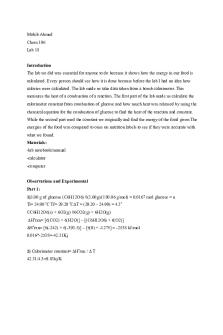Phy9ALab Summer 18 - Lab Maunal PDF

| Title | Phy9ALab Summer 18 - Lab Maunal |
|---|---|
| Author | Jack Lt |
| Course | General Physics |
| Institution | University of California Davis |
| Pages | 28 |
| File Size | 1.7 MB |
| File Type | |
| Total Downloads | 11 |
| Total Views | 124 |
Summary
Lab Maunal...
Description
ISLE%labs%for%Physics%9% The$inspiration$for$these$labs$comes$from$the$PAER$group$at$Rutgers$$ !
General!Information:!! $ There$are$3$types$of$Investigative$Science$Learning$Environment$(ISLE)$labs:$observation$experiments,$ testing$experiments,$and$application$experiments.$$$ $$ Observation$experiments$are$intended$for$students$to$learn$skills$such$as$changing$one$variable$at$a$time,$ clearly$recording$and$representing$observations,$and$making$accurate$observations$without$mixing$them$ with$explanations.$$This$is$the$first$step$of$the$experimental$cycle,$and$allows$you$to$observe$phenomena,$ look$for$patterns$in$data,$and$start$to$devise$explanations$(once$observations$are$carefully$completed).$ $ The$next$step,$once$explanations$have$been$devised,$is$to$do$testing$experiments,$which$is$an$independent$ test$students$design$that$will$test$a$hypothesis$based&on$a$specific$explanation$or$rule.$$This$helps$you$ practice$the$skill$of$making$predictions$about$the$outcome$of$an$experiment$based$on$an$ explanation/rule/relationship.$$For$a$testing$experiment,$you$can’t$just$do$the$experiment$and$record$what$ happens$–$they$must$have$a$predicted$outcome$based$on$some$explanation$–$and$if$the$outcome$of$the$ experiment$agrees$with$the$prediction$it$gives$confidence$that$the$explanation$may$be$correct,$but$if$it$ disagrees,$then$you$know$the$explanation$is$incorrect.$$In$order$to$make$this$judgment,$you$also$need$to$ apply$basic$uncertainty$calculations.$$$(A$guide$for$understanding$uncertainty$is$included$in$this$packet.)$ $ The$third$type$of$experiment$is$the$application$experiment,$where$you$apply$some$ explanation/rule/relationship$that$you$have$tested$enough$that$you$think$it$is$‘good’,$and$you$apply$it$to$ understand$a$new$situation.$$Some$application$experiments$require$that$you$determine$some$unknown$ quantity$multiple$ways$–$in$order$to$determine$if$the$methods$are$consistent,$it$is$necessary$to$apply$basic$ uncertainty$analysis.$ $ By$performing$this$sequence$of$experiments,$it$is$possible$to$explore$and$devise$a$physics$relationship,$test$ it,$and$when$you$are$convinced$it$is$good,$apply$it$to$understand$a$new$situation$–$providing$you$with$a$ complete$understanding$of$the$basic$physics$relationships$(equations).$$By$designing$your$own$ experiments,$it$gives$you$creative$control,$and$assures$that$you$understand$the$steps$that$you$perform,$as$ they$are$done$by$your$conscious$choice,$and$not$by$following$instructions$or$‘playing$around.’$ $
Lab!write2ups:!! $ $There$is$one$lab$writePup$per$group,$each$group$member$must$put$their$name$at$the$top$of$the$writePup$in$ order$to$obtain$credit.$$Since$the$ISLE$labs$are$labs$you$design$yourself,$and$are$intended$to$help$you$learn$ specific$skills$such$as$justifying$your$conclusions,$comparing$results,$and$understanding$how$uncertainty$ comes$into$play,$it$is$important$that$you$explain$your$work$carefully$in$the$form$of$a$lab$writePup.$$The$lab$ writePup$is$done$in&the&lab,$there$is$nothing$for$you$to$do$after$the$lab$period.$$The$writePup$is$not$formal,$ but$does$need$to$be$clear.$$Your$lab$may$have$specific$questions$for$you$to$answer,$or$specific$statements$of$ tasks$to$complete,$in$which$case$you$need$to$answer$and$document$those$things$in$your$writePup.$$The$lab$ will$include$a$general$set$of$bullet$points$that$always$need$to$be$addressed$within$your$writePup.$$Those$ general$bullet$points$are$specific$to$the$type$of$experiment:$observation,$testing,$or$application.$Abide$by$ the$bullet$guidelines$as$closely$as$possible,$and$by$all$means$read$ahead$and/or$make$preliminary$tests$of$ the$equipment$if$it$helps$to$abide$by$them.$However,$if$something$you$do$or$observe$seems$more$ appropriately$addressed$in$a$different$bullet,$it$is$okay.$Just$don't$skip$anything.$ $
Do$not$make$the$mistake$of$writing$too$much$in$your$lab$reports.$$Your$information$does$not$need$to$be$ presented$in$paragraph$form,$or$often,$even$in$complete$sentences.$$You$can$use$equations$instead$of$trying$ to$write$the$math$out$in$words.$$Your$reports$should$have$a$few$sentences$or$bullet$points,$equations$ and/or$diagrams$where$appropriate.$$You$should$address$the$required$points$succinctly$and$clearly.$$Your$ reports$should$not$be$lengthy$or$wordy.$$This$is$good$practice$in$science$writing$and$will$also$save$both$you$ and$the$grader$valuable$time.$$ !
Grading:!! $ If$you$do$not$pass$the$lab,$you$do$not$pass$the$course.$$Your$TA$will$grade$your$lab$writePup$based$on$some$ subset$of$the$items$you$are$asked$to$include.$$Each$item$will$be$graded$out$of$a$possible$of$3$points.$$0$points$ means$the$item$is$not$included$in$the$report.$$1$point$means$the$item$is$included,$but$incompletely,$or$ incorrectly.$$2$points$means$the$item$is$included,$but$with$some$small$mistake,$or$it$isn’t$completely$ explained.$$3$points$means$it$is$correct$and$complete.$$Roughly$5P9$items$will$be$chosen$for$grading$each$ week.$There$is$a$set$of$“rubrics”$for$you$and$for$the$TA$to$use$to$evaluate$your$work.$$You$are$strongly$ encouraged$to$check$your$writePup$with$the$rubrics$while$you$are$doing$the$lab.$$They$are$not$just$used$for$ grading,$but$are$also$intended$to$help$you$fully$understand$the$skills$you$are$to$develop$and$demonstrate,$ and$to$help$you$assess$and$improve$the$quality$of$your$work.$You$TA$will$further$discuss$grading$policies.$ !
Conclusion:!! $ Lab$is$not$for$testing$your$knowledge,$but$is$a$place$for$developing$it.$$Take$advantage$of$the$time$to$explore$ the$physics$relationships$to$your$own$satisfaction,$make$sure$your$work$makes$sense$to$you,$and$use$your$ TA$as$a$resource$to$make$sure$you$leave$the$lab$with$a$good$understanding$of$the$material.$ $
EXPERIMENTAL UNCERTAINTIES !"# $%&'()*+# ,-*./(/&# )*.# 01# 21*'-314# 15*)/+&6# 7.1# )*.# ".+&# 8."9# (/'# :*+-1# 9(/%# *# )13/*(.# 3*.;1# "...
Similar Free PDFs

Phy9ALab Summer 18 - Lab Maunal
- 28 Pages

18 - lab 18
- 4 Pages

Final LAB Review - summer
- 5 Pages

FINS3616 Course Outline Summer 18-19
- 12 Pages

Lab 3 force summer 2011
- 4 Pages

Lab syl Su 16 - summer 2016
- 5 Pages

Lab 5 and 6 Summer 2021
- 5 Pages

Chem 2C Lab Manual 2018 Summer
- 184 Pages

ENSCI 99 Lab Manual Fall 18
- 85 Pages

Lab 1 Isolines Fall 18 proced
- 4 Pages
Popular Institutions
- Tinajero National High School - Annex
- Politeknik Caltex Riau
- Yokohama City University
- SGT University
- University of Al-Qadisiyah
- Divine Word College of Vigan
- Techniek College Rotterdam
- Universidade de Santiago
- Universiti Teknologi MARA Cawangan Johor Kampus Pasir Gudang
- Poltekkes Kemenkes Yogyakarta
- Baguio City National High School
- Colegio san marcos
- preparatoria uno
- Centro de Bachillerato Tecnológico Industrial y de Servicios No. 107
- Dalian Maritime University
- Quang Trung Secondary School
- Colegio Tecnológico en Informática
- Corporación Regional de Educación Superior
- Grupo CEDVA
- Dar Al Uloom University
- Centro de Estudios Preuniversitarios de la Universidad Nacional de Ingeniería
- 上智大学
- Aakash International School, Nuna Majara
- San Felipe Neri Catholic School
- Kang Chiao International School - New Taipei City
- Misamis Occidental National High School
- Institución Educativa Escuela Normal Juan Ladrilleros
- Kolehiyo ng Pantukan
- Batanes State College
- Instituto Continental
- Sekolah Menengah Kejuruan Kesehatan Kaltara (Tarakan)
- Colegio de La Inmaculada Concepcion - Cebu





